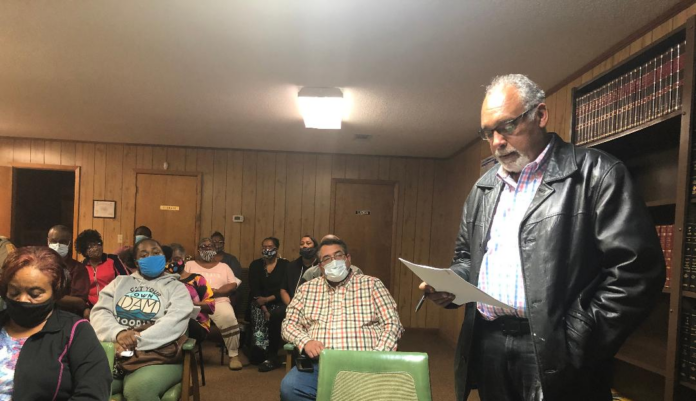
COLONY, Ala. – Colony’s Town Council met Tuesday evening before a packed house at town hall, with council members and others bracing for a fight from the outset. For the first time in a long period, even deputies from the Cullman County Sheriff’s Office were present, dispatched at the request of an unknown person in the town.
Mayor Curtis Johnson challenged the qualification of Town Clerk Patricia Ponder to hold her office. At Johnson’s request, Birmingham attorney Louis Willie came and presented excerpts from the Code of Alabama which, according to him, disqualify Ponder. Defining Ponder’s position as that of a municipal officer, he read from Code 11-43-1:
Qualifications and residence of mayors, councilmen, and officers.
Every mayor, councilman, and officer elected by the whole electorate of the city or town shall be a resident and qualified elector of the city or town in which he shall have been elected and shall reside within the limits of the city or town during his term of office. The councilmen shall be qualified electors of said city or town, residing within the limits of the ward from which they shall have been elected and shall reside within the limits of said ward during the term of their office.
With this he made the claim that the clerk must live within the municipality, despite it being an appointed position approved by the council, and not, in the words of the Code, “elected by the whole electorate of the city or town.” Willie said that the council, having been informed of the code, should act immediately.
Council members Ethel Alexander, Sam Ashford and Eric Carwell opposed Johnson’s demand. Carwell said the council needed more information and might need to consult an independent attorney for an opinion before acting. When Johnson called for a motion to dismiss Ponder, Alexander instead made a motion to retain the clerk for the time being. The following vote split the council: Alexander, Ashford and Carwell for, and Johnson, Cole and Parker against.
According to Ponder, the mayor’s vote cannot create a tie, and so she dismissed Johnson’s vote and declared the vote 3-2 in favor of keeping Ponder in place. Several in the audience disagreed, saying that the vote was a tie and therefore dead.
The Alabama League of Municipalities Council Meeting Manual reads:
If the mayor votes and the vote ends in a tie, the mayor may not vote a second time to break the tie. A mayor cannot vote twice under any circumstance. See, Jones v. Coosada, 356 So.2d 168 (Ala. 1978) and AGO 1982-280 (to Hon. Gwin Wells, April 5, 1982). A tie vote leaves the matter being voted on undecided.
In the positive moment of the night, after a presentation by Lenwood Herron of Greystone Partners LLC, a group that helps municipalities find grants, make infrastructure improvements and recruit business, the council took its only unanimous vote of the meeting: to seek a grant of up to $250,000 to pave roads around the town, starting with Colony Road.
The Colony Town Council meets at 5 p.m. the second and fourth Tuesdays of each month for a work session, followed by the council meeting. The public is invited to attend.
Copyright 2020 Humble Roots, LLC. All Rights Reserved.




















